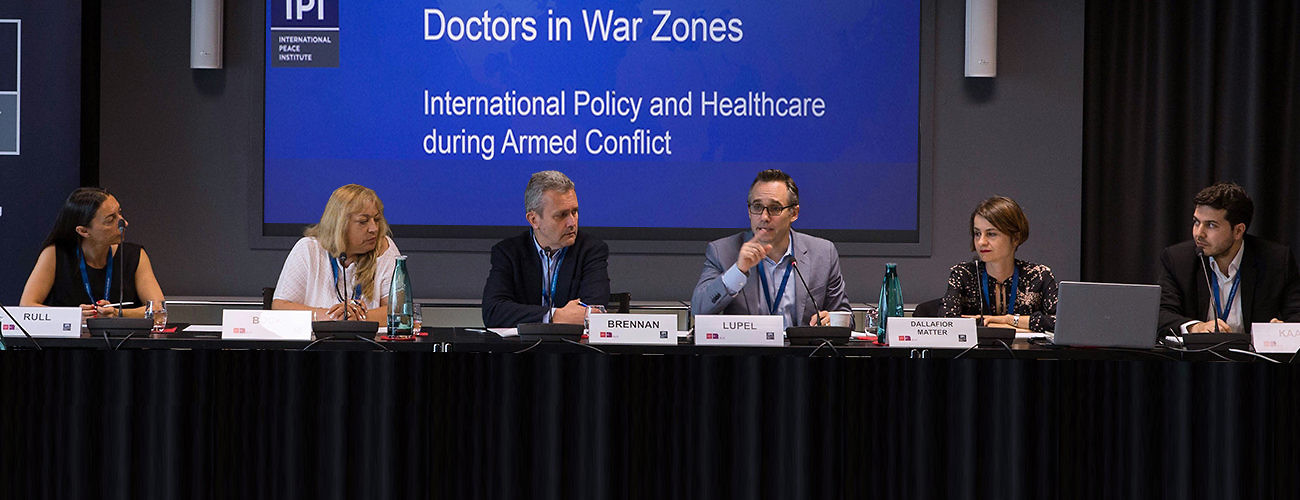The international community has developed a wide array of policies, frameworks, and structures to help respond to health needs in conflict-affected settings, but the international health response still faces gaps and challenges. On June 7th and 8th, 2018, IPI and the Global Health Centre of the Graduate Institute took up this subject in a retreat in Geneva on “Doctors in War Zones: International Policy and Health Care in Armed Conflict.”
Participants debated how we can rethink and redefine existing collaboration models, governance structures, and accountability mechanisms for health and humanitarian actors to ensure the adequate delivery of health services in conflict-affected settings.
The retreat started with a high-level dinner, and was followed by a full day workshop comprised of three moderated discussions on the challenges of delivering health care, health governance systems, and accountability in international health systems in conflict-affected settings.
Opening the retreat with a keynote address at the high-level dinner, Peter Maurer, President of the International Committee of the Red Cross, focused on the issue of attacks on healthcare, highlighting the fact that despite the adoption of United Nations Security Council Resolution 2286 two years ago, attacks on health care workers continue to occur every week. He stressed that there are multiple avenues to be explored, including better understanding of what influences the behavior of belligerents, and engaging in a privileged dialogue with military commands. He acknowledged that we cannot “fundamentally change the fact that powers have different interests,” but that we can change “their consideration of the health impact of their warfare,” which is underlined and reinforced by data.
During the first session, on the challenges of providing health care services in conflict-affected settings, the experience of individuals providing such services in these challenging settings was put front and center, with Dr. Monica Rull of Médecins Sans Frontières emphasizing “the whole dimension of people who cannot access these services.”
Dr. Hanna Kaade, co-founder of the German Global Surgery Association, outlined a series of challenges he personally faced as a medical doctor in Aleppo, Syria, from essential medical equipment being taken out of ambulances at check points, to having to perform surgery under the light of a mobile phone after an electricity shut down. Other challenges such as the difficulty of providing chronic care in conflict-affected settings, the inadequate prioritization of programs, and the impact of contemporary counterterrorism measures were also noted.
On the issue of attacks on health care, some participants stressed the need for continued political and diplomatic efforts, as well as more robust and joined-up humanitarian diplomacy. David McCoy of Queen Mary University, London, encouraged thinking beyond the humanitarian lens to the link between health and peace, stating that “the health community has the legitimacy and mandate to work more upstream” on the prevention of violence and conflict.
Speakers in the second session, on health governance systems in conflict-affected settings, provided an overview of the existing structures and procedures that guide the international health response in such settings, with a focus on the functioning of the UN cluster system, the Inter-Agency Steering Committee L3 Activation Procedure for infectious diseases, and the role of the World Health Organization (WHO). Key challenges mentioned were the use, in protracted crises, of structures that were designed for the short-term, insufficient flexibility and fluidity of the existing system, and the difficulty of transitioning to government-led responses. It was nonetheless stated that there is a distinct reduction in officially activated clusters, with, in many contexts, governments wanting to lead their response, enabled by the international community.
Annie Sparrow, Assistant Professor at the ICAHN School of Medicine, noted the “tension between sovereignty and suffering” that the WHO and other UN agencies face in humanitarian settings, limiting their ability to respond to health needs. Several participants pointed to ways of better working with the existing system, including by better engaging local actors and leveraging outside voices, ensuring that the right people are being hired, and suggesting that civil society actors do more to hold governments and UN bureaucracies to account.
Accountability, or the lack thereof, was identified as a key issue in existing health governance systems, with Mukesh Kapila, Professor of Global Health and Humanitarian Affairs at Manchester University, describing the system as being “self-validating” and “self-certifying” and calling for an independent accountability mechanism.
The final session of the day focused on the crucial question of accountability in international health systems in conflict-affected settings. Participants discussed various types of accountability for health services provided in conflict-affected settings, from performance, to financial and international accountability. An over-emphasis on accountability to donors as opposed to accountability to affected populations was highlighted, as well as the need for stronger community engagement.
Dr. Francesco Checchi of the London School of Hygiene and Tropical Medicine, stressed that when there is a lack of accountability, the impact of the health response is attenuated and can lead to what he described as “malpractice in humanitarian healthcare.” He put forward a series of concrete possible ways to ensure better accountability, including setting up an inter-agency humanitarian healthcare governance project, and having an independent auditing body administer accountability on behalf of affected people.
The retreat was attended by representatives of country missions to the UN, and other international organizations in Geneva, global health and humanitarian experts from the UN, and other international organizations, as well as academics. It is part of a broader research project conducted by IPI on these issues, which will result in a final policy report.
The agenda for the event is available here, and the background paper can be found here.








